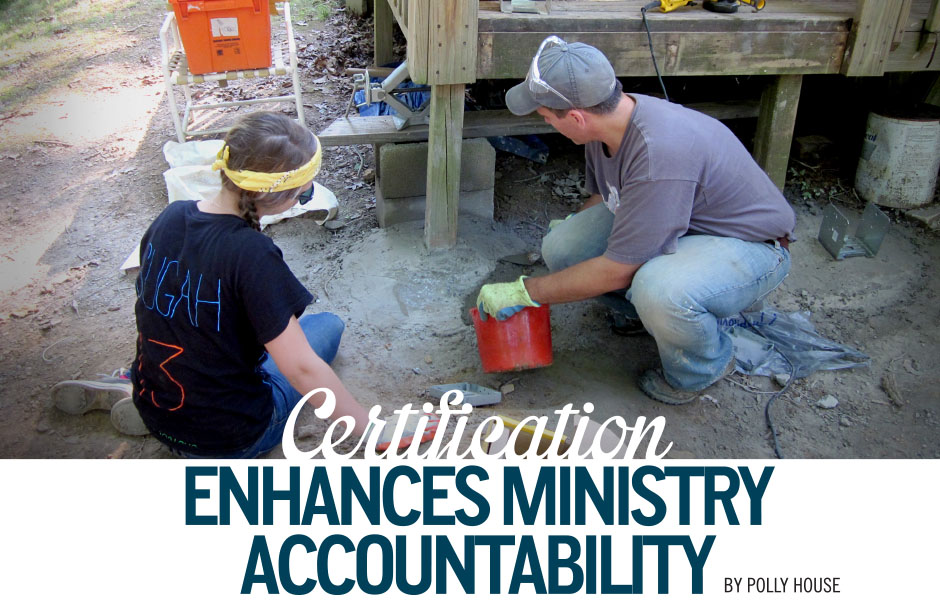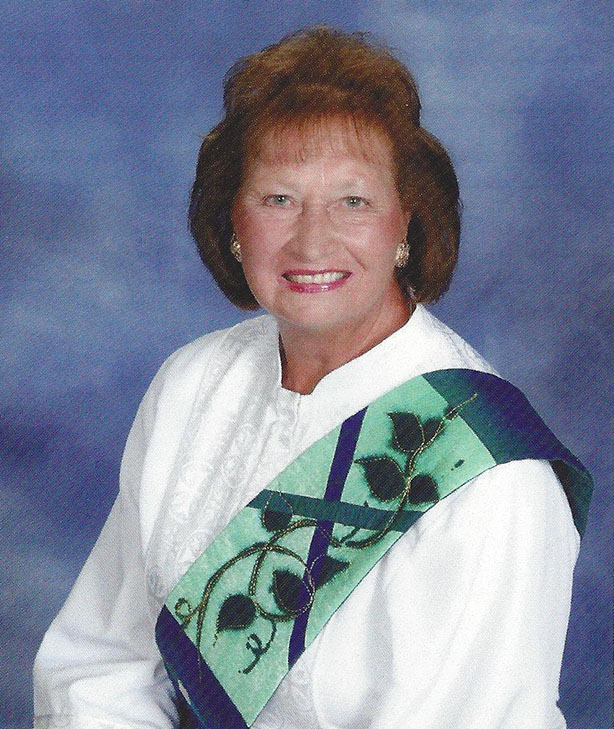



Rev. Rita Hays
COURTESY CONNELL MEMORIAL UMC

James Harrington (left) packages meals for Stop Hunger Now.
COURTESY PHOTO

James Harrington (left) packages meals for Stop Hunger Now.
COURTESY PHOTO
James Harrington was already working with youth in his church when he decided to take his ministry up a notch.
“I loved working with youth and saw it as such an important time in a person’s spiritual development,” he says. “I still do. At the same time, I was also questioning whether I was being called into professional ministry.”
Harrington, who already had earned undergraduate and graduate degrees, decided to pursue United Methodist certification in youth ministry. He completed his studies in youth ministry in 2009 at Wesley Theological Seminary. While pursuing certification, the decision to go into ordained ministry became clear. He is finishing his seminary studies and preparing for his future as part of the clergy.
Certification is The United Methodist Church’s recognition that an individual has been called, made a commitment to serve and met standards for academic training, experience and continuing study to serve with excellence in a specialized ministry. The process is under the auspices of the General Board of Higher Education and Ministry.
“Certification is often the first step for a decision to move into professional ministry,” says the Rev. Robert Carlisle, the board’s certification administrator. “Certification can also help a committed layperson as a volunteer to have a new undergirding and self-confidence for their specialized ministry.”
Called, prepared, committed
“People who receive special advanced training in their chosen area of ministry not only show their commitment to ministry, but also their commitment to maintaining and updating their skills and accountability to their churches,” says the Rev. Victoria Rebeck, director of support for deacon ministry, provisional membership and specialized ministry certification for the board.
The Rev. Rita Hays, associate pastor for children, visitation, Christian education and family ministries at Connell Memorial United Methodist Church in Goodlettsville, Tenn., is one of more than 1,300 people who have earned certifications in more than one area. She was already certified in Christian education when she decided to earn a second certification in children’s ministry.
“I had worked in children’s ministry for over 30 years, taught classes in children’s ministry at the college level, led workshops on the conference and district level, written several books in the area of children’s ministry and fervently advocated for the vital role of children in the local church,” she says.
She sought the second certification to emphasize “the importance of children’s ministry and also as a role model for younger ministers,” she continues. “It was my hope that others entering the field of children’s ministry would be encouraged to seek certification. As an ordained deacon and with post-graduate education, I hoped my example would show that certification was valuable.”
The Board of Higher Education and Ministry has records showing certification in Christian education awarded at least as early as 1949. Certification in music, evangelism and youth ministry began in 1994. In 2000, spiritual formation was added; in 2001, older adult; 2009, children’s ministry; 2010, ministry to the poor and urban ministry, and in 2012, collegiate ministry and ministry with people with disabilities. In all, the board has awarded more than 2,500 certifications.
Together, the United Methodist Association of Communicators and United Methodist Communications offer certification in Christian communications.
Once earned, certification must be renewed every two years through continuing education and updating of skills.
Leaders say local churches gain much when their people get a certification.
“I think a local church that encourages lay or clergy people to enroll in the United Methodist certification process can be assured they will be rewarded with people who have a much deeper commitment to their area of specialized ministry,” Carlisle says. The seminary-level courses will increase their skill levels and provide biblical and theological grounding and understanding of the Wesleyan heritage.
“The opportunities to network with others can help people focus on their own call to ministry,” Carlisle adds. They also gain “a whole new network of colleagues for both resources and support.”
Three tracks of certification are available to both clergy and laity:
- Professional (for lay, licensed or ordained leaders who have an undergraduate degree and take graduate-level courses)
- Undergraduate (for undergraduate students)
- Paraprofessional (for those who do not have a college degree and are working or volunteering in a specialized ministry)
What it takes
Certification entails education, commitment and character. The requirements are detailed at www.gbhem.org/education/certification. Among them are:
- Christian character, personal competence, integrity and commitment to the church’s total ministry and mission
- Ability to work with volunteers and staff and function with emotional maturity and sound judgment
- Demonstrated leadership
- United Methodist Church membership for at least one year
- Knowledge of The United Methodist Church’s structure, polity, resources, program and mission
- Completion of required education and work experience
- Evaluation by the annual conference Board of Ordained Ministry
- Participation in a professional organization related to the area of specialization
Rebeck says those working toward a professional certification are required to earn at least one-third of their study credits in the classroom.
“While many organizations will allow students to do all their classwork online, we feel the time on a seminary campus is valuable,” she says. “Ministry, by its nature, is about relationships. It’s important to get to know people on an individual basis. Through these relationships, you will develop a network of colleagues who will be with you for a long time.”
The cost of certification courses varies, but financial aid is readily available, according to Rebeck.
“The General Board of Higher Education and Ministry offers scholarships for professional certifications at $200 per credit hour,” she says. “We encourage local churches to help support their members who are working toward certification. It is in their own best interest to invest in education.” Conference boards of ordained ministry may have funds available for clergy and some provide support for laity. Seminaries and schools may also provide scholarships.
As an associate pastor, Hays’ responsibilities at Connell Memorial include preaching, visitation and other pastoral duties. Having the certification reminds the congregation of the priority she places on children’s ministry.
“The certification reminds me that I need to be continually reading and keeping informed about the latest trends in children’s ministry,” she says. “It also validates my role in the local church that I serve. It lets the congregation know that I have the education and background as a competent and qualified minister to children.”